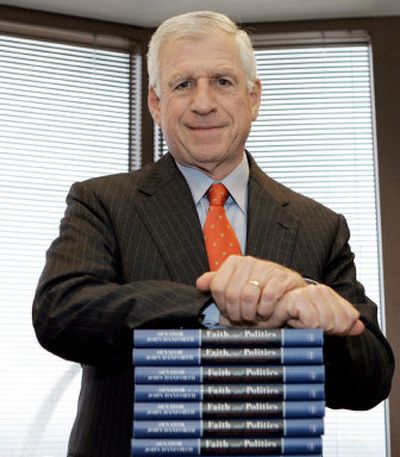Fall book preview

This fall, former Sen. John C. Danforth will tour the country in support of his new book, “Faith and Politics” – an attempt, he says, to start a discussion about the role of religion in elections and government.
He will not be alone.
Religion in politics – a key topic of the 2004 presidential campaign, and possibly for 2008 – is the subject of numerous books over the next few months, including Mel White’s “Religion Gone Bad,” Dan Gilgoff’s “The Jesus Machine,” Richard Dawkins’ “The God Delusion” and the Rev. Barry W. Lynn’s “Piety & Politics.”
Most of the authors have harsh criticism for religion’s impact, with Dawkins writing in disgust about “a system of morals which any civilized modern person, whether religious or not, would find … obnoxious.”
Others, such as Jonathan Miller, a Democrat and Kentucky’s state treasurer, see a positive, unifying role for religion. His “The Compassionate Community” advocates a “values-based policy agenda,” based in part on biblical writings, and includes an afterword by former Vice President Al Gore, a Democrat.
Danforth, an Episcopal priest and former Republican senator from Missouri, says he was inspired to write “Faith and Politics” by the dispute over Terri Schiavo, the irreversibly brain-damaged Florida woman who became a favorite cause of the religious right, and leading Republicans.
“That was the two-by-four that hit me over the head. I felt that was totally inappropriate and out of hand,” he says.
“The question is whether religion is a reconciling participant in world affairs and American life, or whether it’s divisive. To the extent that there has been a marriage of the Republican Party with the Christian right, I think religion has been a divisive factor in political life.”
President Bush still has more than two years left in office, but authors aren’t waiting to write his history.
Two best-sellers from the summer, Thomas Ricks’ “Fiasco” and Ron Suskind’s “The One Percent Doctrine,” offered inside stories of the administration’s handling of the war on terror. That continues this fall with Bob Woodward’s “Inside the Bush White House, the Second Term” and Michael Isikoff’s and David Corn’s “Hubris.”
Pulitzer Prize-winning historian James MacGregor Burns assesses the leadership of Bush and other recent presidents in “Running Alone.” Frank Rich’s “The Greatest Story Ever Sold” reviews how the administration has shaped its own narrative. Lewis Lapham’s “Pretensions to Empire” examines the president’s actions and offers a two-word conclusion: impeach him.
Former Secretary of State Colin Powell will have his say in Karen DeYoung’s “Soldier,” an authorized biography. Former Attorney General John Ashcroft looks back in “Never Again” and John Yoo, the ex-Justice Department lawyer who helped shape the Bush administration’s controversial legal guidelines for its war on terror, presents his case in “War by Other Means.”
After a disappointing year for literary fiction in 2005, this fall offers many promising releases, starting with “All Aunt Hagar’s Children,” a collection of stories by Pulitzer Prize winner Edward P. Jones. Other highlights include Richard Ford’s “The Lay of the Land,” Charles Frazier’s “Thirteen Moons” and Thomas Pynchon’s epic “Against the Day.”
“The list looks much stronger than last year,” says Barnes & Noble, Inc., fiction buyer Sessalee Hensley. “This is the most literary fall I’ve seen in a long time.”
Other literary works include Cormac McCarthy’s “The Road”; Alice McDermott’s “After This”; William Boyd’s “Restless”; Margaret Atwood’s “Moral Disorder”; Alice Munro’s “The View from Castle Rock”; and Edna O’Brien’s “The Light of Evening.”
Beach reading season is ending, so prepare for “porch reading” – intellectual thrillers such as Michael Cox’s “The Meaning of Night” and Jed Rubenfeld’s “The Interpretation of Murder.”
Stephen King, Patricia Cornwell, Brad Meltzer, Walter Mosley and Mitch Albom will also have novels out, while John Grisham turns to nonfiction with “The Innocent Man: Murder and Injustice in a Small Town.”
In other fall releases, Neal Gabler, author of the Hollywood history “An Empire of Their Own,” takes on the industry’s greatest myth-maker in “Walt Disney.”
Audrey Hepburn will be the subject of two books this fall: Donald Spoto’s “Enchantment” and a memoir by her son, Sean Hepburn Ferrer, “The Audrey Hepburn Treasures.” Ellen Burstyn recounts “Lessons in Becoming Myself,” while memoirs from Rupert Everett and Peter Falk also are expected.
“Desperate Housewives” star Felicity Huffman has co-authored “A Practical Handbook for the Boyfriend” – the prelude, perhaps, to “The Desperate Housewives Cookbook,” with its recipe for “Babysitting Cookies,” chock full of chocolate chips and peanut butter, “smooth or chunky.”
Sharon Osbourne tells all in “Sharon Osbourne Extreme,” Snoop Dogg has written a novel, “Love Don’t Live Here No More,” and Courtney Love’s diaries will be published in “Dirty Blonde.”
“U2 by U2” is the Irish rock band’s official story. “Exile on Main Street” is journalist Robert Greenfield’s firsthand report on the chaotic, drug-induced recording of the Rolling Stones’ classic double album.
“Greetings from E Street,” a retrospective of Bruce Springsteen and his band, continues a mini-trend of scrapbook-style music biographies, featuring replications of notebooks, concert tickets and other artifacts. Bob Dylan, John Lennon and Bob Marley have been the subjects of similar projects.